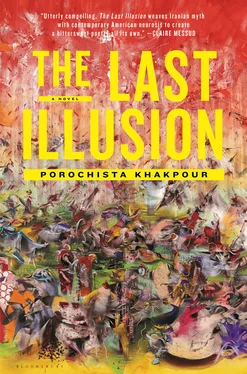Zal lived about as downtown as Asiya lived uptown, in the neighborhood in lower Manhattan that his father used to live in back when it was undesirable. His apartment, too, was his father’s first apartment after Columbia, a studio in a formerly run-down warehouse district by the water, the end of the entire island, a place nobody but those who had to hung out. By Zal’s time, everything had turned upside down and it was suddenly a neighborhood of boutiques, galleries, bistros, champagne bars, vegan doughnut shops, and couples of the most glamorous ilk, who were, if not directly related, then distant cousins of the financial world just blocks away. It was where a sort of invincible young and rich lived, the type whose livelihood it was always impossible to imagine, the ones who made you feel like you were in the cinema version of Manhattan life. Zal, of course, did not quite fit in. But sometimes, now that Asiya was over on his end of the island more and more, he wondered if he could have a chance at it. He imagined Asiya pregnant and in an elegant trench coat, her hair in long loose curls and a red painted smile on her lips that nothing could wipe away, and himself in a suit and umbrella and fedora; he imagined their loft, purposefully bare except maybe for Asiya’s art and evidence of whatever the hell he was to do.
With Asiya back in his life, he was off the job track. It was as if a girlfriend was a full-time job — he just forgot all about working. Once again, he lost himself in her, and it felt good almost. It was delaying the inevitable, a crisis Zal was sure was going to come his way the more normal he got.
Who was he, and what was he going to do with himself?
It was a most human question, after all.
He put it off. So had she: Asiya was in an interesting period, a quiet one, a stable one, he thought. She had stopped her work altogether, never visiting her studio to work on prints, never even taking her camera out, never commenting on perfect shots like she used to. There was no talk of birds, living or dead.
Out of concern, and out of reward, for her sudden normalcy — and in homage to that future vision of their movie star selves — Zal decided to do something special for her birthday that summer. On a map of New York in his apartment, Asiya had made red pencil markings on various streets and subway stops and landmarks, but the one she had drawn several circle scrawls around, with a couple of asterisks to boot, was a landmark not far from him: the World Trade Center.
Maybe she wanted to go there. Zal, after all, had never been there.
He asked his father if there was a place to go there for a birthday.
“Well, there’s a restaurant and of course the bar on top, Windows on the World or whatever it’s called,” Hendricks said. “It’s pricey, Zal, and I think you need a reservation for a proper booth. So whose birthday?” He was dreading the answer, having a feeling that he already knew.
“You don’t know her,” Zal said, ready for it. “It’s a new friend.”
“A new. . woman?”
“Yes, a new woman,” Zal echoed. “You’ve been there?”
“Only once,” he said. “I went alone after Nilou died. She had always wanted to go there and we never got a chance, so I went there when I started going to all the places she’d always wanted to go with me.”
“You liked it?”
“It was okay,” Hendricks said. “Not really my thing, those high-rise tower bars. But you’d love it. You love that stuff.”
Heights, Zal thought. It was true: he had a love of heights. “I’ll take her there then,” Zal said and got off the phone.
It was the first time he was doing something for Asiya, and it felt good. When he made a reservation for “Hendricks,” it also felt good. He was “Hendricks,” a Hendricks that was not his father, but himself, getting there at least. He could even be “Hendricks Party of Two.”

The one thing Asiya did not expect on her birthday was to get surprised by Zal. She thought it would go more or less like the last birthday that she couldn’t even remember but that was spent with him, an ordinary summer day, maybe a walk on a pier, maybe some ice cream, maybe even a nice dinner out. But this was clearly different: Zal had woken up that morning antsy, all nerves, finally caving in to her questioning:
“Fine, yes, there’s a surprise,” he said. “Do you really want to ruin it?”
She smiled softly. “I just hate surprises, that’s all. I mean, historically, surprises, given my anxiety disorder, were never very easy on me, but this is going to be different. I can feel it in my bones.” She closed her eyes and kept smiling, as if that, too, was a psychic premonition, but for once of the best kind.
All he told her was to dress up. She was about to complain and insist that she never dressed up, but then she saw the joy in his eyes when he got to tell his woman to dress up, and so she quickly consented. She went home — she had been spending less and less time there, just checking in on Willa and Willa alone, with Zachary still almost completely moved out — and picked out the only dress she had, a high school graduation dress her mother had bought for her, which she only wore that one time. It was a navy silk strapless number and it had been too sexy back then, though she had still worn it, out of a sense of duty. It still fit her perfectly, and she even took the tiniest bit of joy in its sexiness. Zal, this new Zal, this finally-boyfriend, would love it, she thought.
When she returned to his place, lightly made-up, teetering in old high heels, and wearing that dress, she saw that Zal was also dressed up and apparently had been for a while. He was sitting on a chair, just waiting for her, in the suit his father had gotten him for his Vegas trip, the only suit he had, which Asiya had never seen. He looked handsome, though more serious than ever, professorial almost, in that austere charcoal.
“Look at us!” Asiya exclaimed.
“We’re something,” Zal shot back, and held a glass out to her.
Pink champagne. It was the first time since Willa’s party either of them had had pink champagne. Asiya saw that he had poured it in a juice cup — either he didn’t own champagne flutes or he just didn’t know — but she took it gratefully, and they clinked glasses and drank. She started to think this was the only surprise — which would have been good enough, she thought, considering —when Zal looked to his watch and gasped.
“Oh no! I’ve been so good about it and now we’re almost late!”
“Late? To what?” Asiya smiled.
Zal was already up and scrambling for keys, wallet, phone. “To the surprise!”
She couldn’t help but ask: “Dinner, right?”
“Asiya, you’re ruining it! Yes, dinner, fine! But you don’t know where the surprise is!”
“Our café?” she guessed.
He gave her a look. “Dressed up like this?”
She laughed. “Okay, okay, I’ll just stop.”
He kissed her quickly on the head, grabbed her wrist, and led her out. There wasn’t much time left.
They caught a cab, and Zal handed the address to the driver on a card. “The destination is a surprise for the lady, so I don’t want to say it.” The cabdriver smiled, amused.
In the cab, he was breathing hard. It was his first real, expensive dinner for a woman, and reservations had been so difficult to get — he’d practically had to beg — and now they were almost late. He tried to meet her eye once in a while, but he met the face of his watch even more.
“We’re really close, but we’re running out of time,” he said, staring out into the twilight-struck lower Manhattan.
Читать дальше













